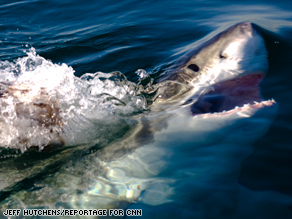*********
Wow! What an eye-opener! What a wake-up call! I almost felt guilty for laughing for the entire hour before watching The Office and 30 Rock (NBC has the best Thursday night lineup). I remembered when I was done watching the latter that Planet in Peril was supposed to be coming on at 9. I wondered whether I missed it. Much to my pleasure, the show was still on. I'd missed the first hour, but what I watched for the rest of the program left me with tears in my eyes, pain in my heart, and the desire to watch more.
*********
What I first saw was the segment on shark fins. Sharks are pretty sinister-looking creatures, but one can’t deny the curiosity (and terror) they invoke in humans. I learned about chumming, tourism in South Africa, and some of the policies surrounding this Chinese delicacy.

It was pretty disgusting, actually. They kill thousands and thousands of sharks, most of the bodies seem to be MIA, and all for soup? Sharks are incredible creatures, and are crucial to the oceanic food chain. I understand that this is a part of culture, but there should at least be stronger policies and restrictions on this sort of fishing.
On a lighter note, it was pretty amazing to watch Anderson Cooper go diving with the sharks sans cage! He’s so pale and scrawny, but MAN, he’s got some cojones. Just another reason I love Anderson Cooper! You can check out the photos here.
*********

I am an animal lover, but I am especially a MAMMAL lover. Most people who know me know that I love monkeys and great apes, but I also love elephants. They truly amaze me. I walked to the National Zoo a couple of weeks ago, and could not stop watching the elephants! I took pictures of them, and stayed at their exhibit for too long (I missed the Great Ape House). While African elephants are the most mesmerizing to me, the Asian elephants are pretty darned cool too (even though the Asian elephants are going to bogart half of the zoo, forcing the zookeepers to get rid of the JUMBO Nile hippo, Happy, in 2009).
With all my studies of elephants since childhood, and my more recent studies of the conflicts in Sudan, I had been completely blind to the issues of animals during war time. Of course I’m worried about the people (which perhaps explains how I missed the animal issue in the first place), but many of the animals impacted during times of war are endangered species, and animals that I would love my future children and grandchildren to experience the beauty of.

Elephants are generally killed for their tusks. As Lisa Ling pointed out last night, these are the largest land animals (HUGE creatures), and yet they are killed only for a small part of their mass. This segment featured shots of elephant carcasses with missing eyes, deteriorating, and trunkless. It was a very grotesque sight, all the while upsetting. One of the saddest points in this segment featured a recently slaughtered baby elephant that didn’t even have tusks! Ling was left speechless.
As was stated by the elephant expert, ivory (from elephant tusks, though also common in those deadly Nile hippos) is a major commodity in the international market. They stated that a pound of ivory could go for about $400. China and, big shocker, the U.S. are the largest importers of ivory. Who is killing the Central African elephants for their ivory? Drum roll please… The same people who are killing thousands of innocent Sudanese and Chadians. So what does that mean? People who are purchasing ivory are more likely than not directly funding these civil wars! The soldiers use the money from their ivory sales to purchase more weapons, thereby killing more Sudanese and more African elephants. And so the cycle continues…
*********
 Another animal that has been greatly impacted by human warfare is the mountain gorilla. http://www.gorillafund.org/ Fortunately, there was some silver lining in this dark cloud. Many Rwandan communities have taken it upon themselves to protect the mountain gorillas. The gorillas have helped bring life to their economy following the genocide of the last decade. Gorillas have brought tons of tourists, which has been a great thing for both the animals and the people. The gorilla population is thriving, and the Rwandan economy has improved.
Another animal that has been greatly impacted by human warfare is the mountain gorilla. http://www.gorillafund.org/ Fortunately, there was some silver lining in this dark cloud. Many Rwandan communities have taken it upon themselves to protect the mountain gorillas. The gorillas have helped bring life to their economy following the genocide of the last decade. Gorillas have brought tons of tourists, which has been a great thing for both the animals and the people. The gorilla population is thriving, and the Rwandan economy has improved.Unfortunately, this is not the case in the “Democratic” Republic of the Congo. The Congolese have been killing the mountain gorillas, seemingly, just for the hell of it. They use them as trophies, and they also use the mountainous regions where these gorillas dwell, coming into direct violent contact with these amazing creatures.
*********
I suggest everyone check out Planet in Peril. It's a real eye-opener.




1 comment:
I couldn't bring myself to watch it. Like you I am a major animal lover but I would be haunted by the images for years. I know what is happening but I simply cannot bring myself to watch it. I am not sure what that says about me.
Post a Comment